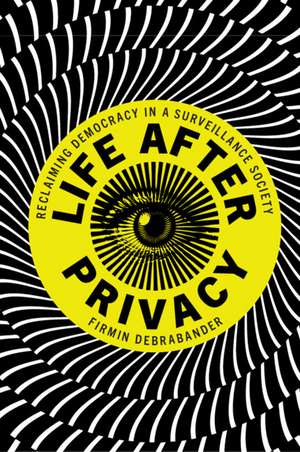Life after Privacy: Reclaiming Democracy in a Surveillance Society
Autor Firmin DeBrabanderen Limba Engleză Paperback – 7 sep 2020
| Toate formatele și edițiile | Preț | Express |
|---|---|---|
| Paperback (1) | 144.94 lei 22-36 zile | +35.81 lei 5-11 zile |
| Cambridge University Press – 7 sep 2020 | 144.94 lei 22-36 zile | +35.81 lei 5-11 zile |
| Hardback (1) | 571.01 lei 43-57 zile | |
| Cambridge University Press – 7 sep 2020 | 571.01 lei 43-57 zile |
Preț: 144.94 lei
Nou
Puncte Express: 217
Preț estimativ în valută:
27.74€ • 30.15$ • 23.32£
27.74€ • 30.15$ • 23.32£
Carte disponibilă
Livrare economică 31 martie-14 aprilie
Livrare express 14-20 martie pentru 45.80 lei
Preluare comenzi: 021 569.72.76
Specificații
ISBN-13: 9781108811910
ISBN-10: 1108811914
Pagini: 180
Dimensiuni: 152 x 227 x 10 mm
Greutate: 0.27 kg
Editura: Cambridge University Press
Colecția Cambridge University Press
Locul publicării:New York, United States
ISBN-10: 1108811914
Pagini: 180
Dimensiuni: 152 x 227 x 10 mm
Greutate: 0.27 kg
Editura: Cambridge University Press
Colecția Cambridge University Press
Locul publicării:New York, United States
Cuprins
Preface; 1. Confessional Culture; 2. Defenses of Privacy; 3. Big Plans for Big Data; 4. The Surveillance Economy; 5. Privacy Past and Present; 6. The Borderless, Vanishing Self; 7. Autonomy and Political Freedom; 8. Powerful Publics; Conclusion.
Recenzii
'… Life After Privacy: Reclaiming Democracy in a Surveillance Society is an eloquent, compelling call for us to rethink our commitment to privacy by understanding its history and uses. Rather than attempting to double down on a possibly doomed principle, DeBrabander argues that what is really needed is more democracy, and specifically a newly energized commitment to a public sphere that requires open, transparent, and meaningful debate. An indispensable book for our times that does what great political philosophy needs to do - make us question what we mean by our most basic concepts.' William Egginton, author of The Splintering of the American Mind
'In 2020, more so than in 1984, the Big Brother is watching you. But does this really matter? - asks Firmin DeBrabander's pungent new book. Ranging from intellectual history to contemporary economics, from Big Data to Big Politics, from confession to contestation, Life After Privacy argues that we should finally begin caring for the public realm, rather than obsessing about intrusions into the private domain, which is something of a political fiction. If there is a work with the potential to reframe the very terms of the current debate on privacy, it is the one you are now holding in your hands!' Michael Marder, author of Political Categories: Thinking Beyond Concepts
'This book makes accessible a counter-intuitive (perhaps even seemingly-contrarian) argument about privacy that deserves a hearing. Not all readers will agree with DeBrabander's conclusion that privacy is pretty much dead. But this is a view murmured often enough in Silicon Valley to warrant serious attention. DeBrabander understands our skepticisms but skillfully argues that we are inexorably drawn to this conclusion nonetheless. Those who care deeply about privacy, as well as those who look forward to the transparent society, will learn much from this book's subtle arguments. And remember: the best philosophy books are the ones that strike you as implausible by their title but leave you convinced after you've read them.' Colin Koopman, author of How We Became Our Data
'Life After Privacy does a good job of setting our angst in a historical or philosophical setting.' Richard Waters, Financial Times
'This is public philosophy at its best.' Paul Showler, LSE Review of Books
'In 2020, more so than in 1984, the Big Brother is watching you. But does this really matter? - asks Firmin DeBrabander's pungent new book. Ranging from intellectual history to contemporary economics, from Big Data to Big Politics, from confession to contestation, Life After Privacy argues that we should finally begin caring for the public realm, rather than obsessing about intrusions into the private domain, which is something of a political fiction. If there is a work with the potential to reframe the very terms of the current debate on privacy, it is the one you are now holding in your hands!' Michael Marder, author of Political Categories: Thinking Beyond Concepts
'This book makes accessible a counter-intuitive (perhaps even seemingly-contrarian) argument about privacy that deserves a hearing. Not all readers will agree with DeBrabander's conclusion that privacy is pretty much dead. But this is a view murmured often enough in Silicon Valley to warrant serious attention. DeBrabander understands our skepticisms but skillfully argues that we are inexorably drawn to this conclusion nonetheless. Those who care deeply about privacy, as well as those who look forward to the transparent society, will learn much from this book's subtle arguments. And remember: the best philosophy books are the ones that strike you as implausible by their title but leave you convinced after you've read them.' Colin Koopman, author of How We Became Our Data
'Life After Privacy does a good job of setting our angst in a historical or philosophical setting.' Richard Waters, Financial Times
'This is public philosophy at its best.' Paul Showler, LSE Review of Books
Notă biografică
Descriere
Privacy, which digital citizens eagerly relinquish, is not so essential to the health and welfare of democracy after all.












